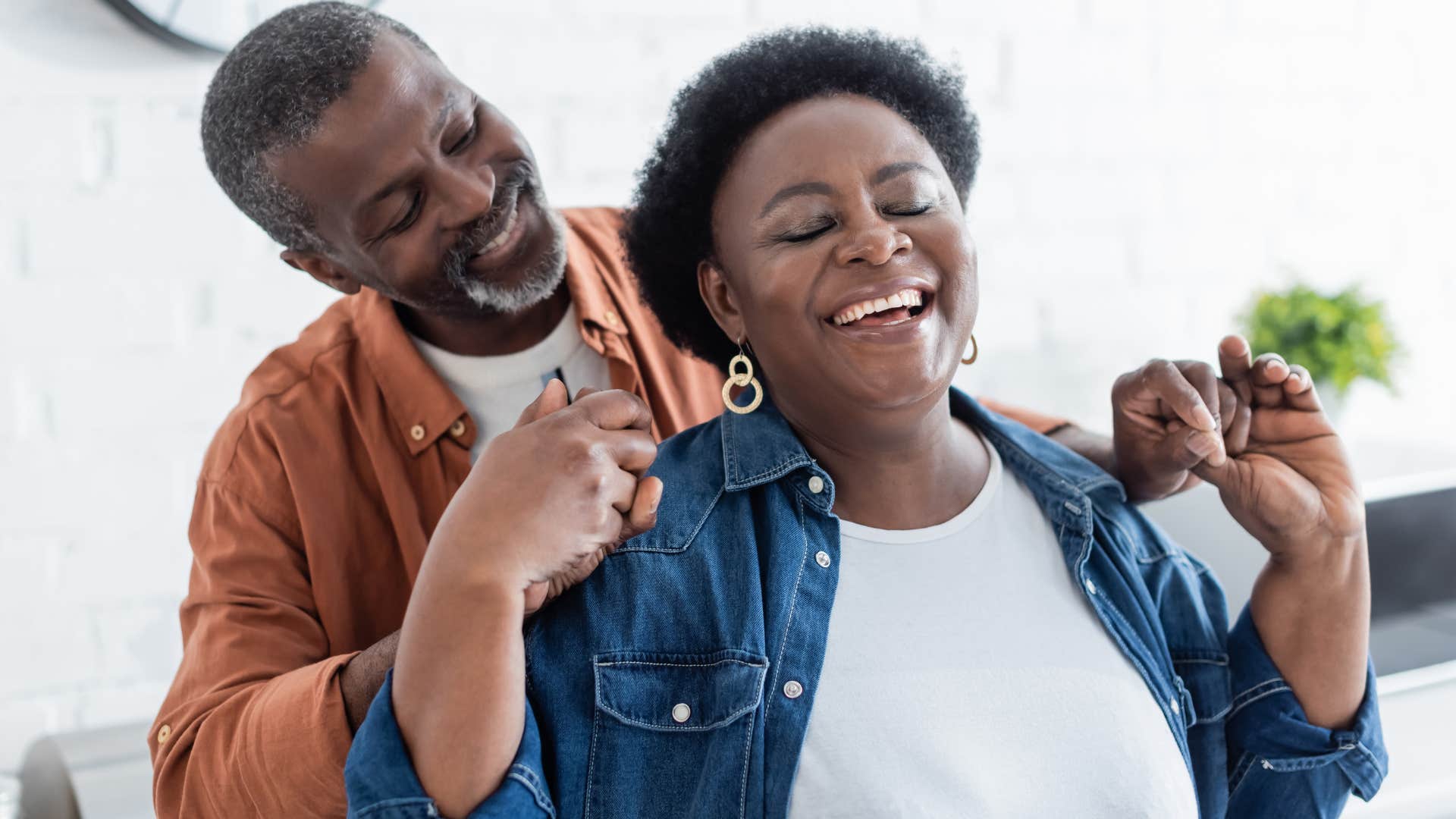11 Signs Of A Married Couple With The Kind Of Mutual Respect That Translates Into Deep, Forever Love
They care about making each other feel safe and understood.
 Lordn / Shutterstock
Lordn / Shutterstock While many people can recognize that mutual respect is essential for relationships from afar, it’s often easily overlooked by partners amid the chaos of everyday life or in the heat of an argument at home. According to Marty Nemko, Ph.D., even small moments, like a check-in at the end of the day, help to boost mutual respect, ensuring that couples have the tools they need to solve problems and accept differing opinions or emotions.
Many of the signs of a married couple with the kind of mutual respect that translates into deep, forever love are subtle and unsuspecting, but they are profound. They bring couples together, ensure they’re working from the same team, and give a safe space for communication that’s never petty, undermining, or resentful.
Here are 11 signs of a married couple with the kind of mutual respect that translates into deep, forever love
1. They resolve conflicts as a team
 Fizkes | Shutterstock.com
Fizkes | Shutterstock.com
Even if they disagree about something or express concerns about the relationship, partners who truly respect one another always resolve conflict on the same team. They never take small jabs or petty moves to ensure they “win” an argument, because to “win” would really be to make sure each person feels loved, valued, and heard.
According to experts from Stanford University, the key to these healthy arguments is for each partner to envision themselves as a third party. They can regulate their own emotions, see others’ points of view, and craft their own thoughts without the pressure of proving their worth or chasing attention.
2. They always feel emotionally supported
 Ground Picture | Shutterstock.com
Ground Picture | Shutterstock.com
Whether they’re talking about the future, having a hard day, or arguing, unconditional emotional support is one of the signs of a married couple with the kind of mutual respect that translates into deep, forever love.
Even if they don’t agree with what their partner is saying, they can still emotionally support them and craft a safe space for them to regulate and reflect. It’s not always easy to put your own needs and ego to the side, but partners who respect each other are always willing to put in work for the sake of their relationship and their partner’s health.
3. They don’t make big decisions alone
 Goksi | Shutterstock.com
Goksi | Shutterstock.com
While they’re empowered to make small everyday decisions on their own, many partners with a solid foundation of mutual respect don’t make big life decisions without consulting their partners. They see their partners as equals in the relationship, no matter what roles they adopt, so they regularly offer them the consideration of a conversation before doing things on their own.
As a 2019 study suggests, it’s this mutual respect and conscious attention, even in seemingly insignificant parts of life, that truly protect a couple’s happiness and longevity.
4. They’re both confident
 stockfour | Shutterstock.com
stockfour | Shutterstock.com
According to a study published in the Personality and Social Psychology Bulletin, people with low self-esteem often attract and seek out people similar to them — or even partners who give them a sense of misguided control or protection. That’s why to have a truly balanced kind of love and mutual respect, confidence, and self-assuredness is key.
When both partners are confident and self-assured, they show up as their best selves with their partners. They’re not always begging for attention or trying to cope with internal disarray at the expense of their partner.
5. They’re flexible in regard to their partners' needs
 Rawpixel.com | Shutterstock
Rawpixel.com | Shutterstock
Whether their partner is having an “off” day or even needs extra support around the house during a chaotic week, being flexible is how long-term partners maintain a level of mutual respect and love. They’re willing to adapt to the needs of their partner and even change their own plans to make sure they feel supported.
According to a study published by the Frontiers in Psychology journal, this kind of adaptability in partners often leads to more fulfilling, happy, and healthy lives, promoting both better relationship satisfaction and personal well-being.
Other parents who are more stagnant and rigid, both with their schedules and their relationship habits, grow resentful quickly. Still, flexible partners make space for their partners, no matter what the situation looks like.
6. They express gratitude often
 Lightfield Studios | Shutterstock.com
Lightfield Studios | Shutterstock.com
As a study from the Harvard School of Public Health argues, partners who regularly practice gratitude in their relationship tend to live more fulfilling, balanced lives. However, they also boast better mental health and self-esteem, with the power of giving “thanks” on their side, even in the small, casual moments throughout the day.
Their gratitude is rooted in responsiveness, a trait that helps them make space for their partner and ensures they feel loved, understood, and valued in everyday life. Alongside mutual respect and trust, these practices may seem subtle, but they truly revolutionize the everyday moments that make the biggest difference for a couple’s happiness and well-being.
7. They protect each other’s reputation
 Monkey Business Images | Shutterstock.com
Monkey Business Images | Shutterstock.com
Whether it’s talking to their friends when their partner isn’t around or venting about personal struggles with family, a partner with respect for their spouse never puts their reputation at risk. When they have true concerns, they bring them up directly with their partner, leveraging healthy communication habits to work through them together.
So, even if the bonding nature of drama and gossip is tempting with their friends, they always have that internal feeling of respect for their partner that protects them from putting their relationship’s external perception or reputation at risk.
8. They don’t weaponize to get what they want
 bbernard | Shutterstock.com
bbernard | Shutterstock.com
From weaponizing affection when they’re upset, to using their partner’s fear against them, and even picking at insecurities when they feel hurt, all of these weaponizations are most common in toxic and resentful couples.
People with mutual respect that translates into deep, forever love are open about communicating their needs and concerns, so they don’t need to leverage these passive-aggressive tactics to feel comforted or heard.
9. They ask for advice often
 Goksi | Shutterstock.com
Goksi | Shutterstock.com
A partner who truly respects and trusts their partner will regularly ask for their advice and insights. They trust their judgment, even when they’re personally feeling stressed or uncertain, and often seek it out when they need support.
Of course, in any relationship, both giving and receiving advice takes a level of emotional intelligence, self-awareness, and restraint, all of which healthy partners often already have and benefit from in other aspects of their relationship. They know when to ask for advice, when to offer it, and when to simply listen and emotionally support the other.
10. They keep their commitments
 DavideAngelini | Shutterstock.com
DavideAngelini | Shutterstock.com
Respecting a partner’s time and energy is just as important as respecting their character and identity. Whether it’s keeping their promises, showing up for commitments, or being on time when they’re meeting with their partner outside of the home, they’re always cognizant of little gestures and moments that can ensure their partner feels valued.
Of course, things happen and people will sometimes need to show up late or cancel plans, but the pattern of their behavior is clear: they care enough about their partner to actively respect their time, even if it’s not necessarily convenient for them in the moment.
11. They give each other grace
 Pics Five | Shutterstock.com
Pics Five | Shutterstock.com
Giving your partner the benefit of the doubt isn’t always easy, but it’s one of the signs of a married couple with the kind of mutual respect that translates into deep, forever love. They’re careful about taking things personally and often express when things hurt their feelings, even if it inevitably ends in a careful apology and moment of grace.
As psychologist Jeffrey Bernstein explains, offering empathy and putting energy into understanding your partner's struggles often comes back to you in some way, cultivating trust and boosting the well-being of a relationship. Assuming and knowing deep down that they have good intentions ensures that all communication, even arguments and conflict, is healthy and well-mannered.
Zayda Slabbekoorn is a senior editorial strategist with a bachelor’s degree in social relations & policy and gender studies who focuses on psychology, relationships, self-help, and human interest stories.

